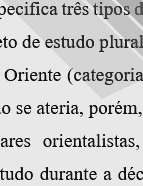

................................
(2) the identification of the determining factors of the historical process, in pursuit of the causality leading to the identification of reasons that were, on the one hand, typical of the social-economic structure and, on the other, of political action; (3) and finally, the configuration of this political action, and in this regard with the development of interpretative tendencies of a more avant-garde or egalitarian nature.
National Independence and Anti-imperialism
In the Portugal of the late 1930s, the then few Marxists sought to denounce what, in their view, was the excessive attention devoted to the past. In those years when the cultural policy of the Estado Novo invested greatly in the cult of the past, with the commemorations of the two hundredth anniversary and the exhibitions of the Portuguese world, a young man by the name of Fernando Piteira Santos, still a student at the Faculdade de Letras da Universidade de Lisboa, and already navigating within the orbit of the PCP, criticised what he referred to as "verbose pastism" (Santos, "Considerações acerca da vida pública e dos meus compatriotas" [“Considerations regarding public life and my compatriots”], 1939). Criticism of this nature was all the more vehement since it was based on the understanding of several young Marxists of their militant mission: still under the impulse of the 1917 revolution, this mission was undertaken with the aim of precipitating a future deemed to be in keeping with their ideals. In order that humanity might more quickly embrace that tomorrow, they regarded the past as a burden from which the present needed to free itself.
However, the situation changed from the 1940s onwards. During the course of this decade, not only greater investment in historiographical research was observed among the Marxists, but also increased interest in the past itself, which cannot be dissociated from the nationalisation process of Marxism. In contrast to the dominant narratives, Marxist historiography sought to understand the past in its universality and internationality, but simultaneously promoted the constitution of a new nationalism, alternative to both the official nationalism - albeit with continuities that were by no means negligible - and to the nationalism that was characteristic of other sectors standing in opposition to the regime, namely those inspired by republicanism.
